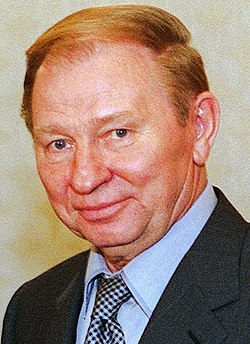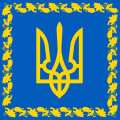
The president of Ukraine is the head of state of Ukraine, directly elected to a five-year term by voting eligible citizens of Ukraine. [1] The officeholder leads the executive branch of the government and is the commander-in-chief of the Armed Forces of Ukraine. The current office was formed when the Verkhovna Rada of the Ukrainian Soviet Socialist Republic passed a law on 5 July 1991 establishing the office of the "President of the Ukrainian Soviet Socialist Republic." [2] Upon the declaration of Ukrainian independence from the Soviet Union on 24 August 1991, the title was changed to "President of Ukraine". The first presidential election held on 1 December 1991 was won by Leonid Kravchuk.
Contents
Every president of Ukraine except for Volodymyr Zelenskyy has been a People's Deputy of the Verkhovna Rada prior to their election, with Kuchma, Yushchenko, and Yanukovych all previously serving as Prime Minister and Kravchuk as well as acting president Turchynov previously serving as Chairman of the Verkhovna Rada. Kravchuk was the first president to resign from the office, following a power struggle with Prime Minister Leonid Kuchma. After the 2014 Ukrainian revolution, Viktor Yanukovych abandoned the office and fled the country. He was subsequently impeached and temporarily replaced by Chairman of the Verkhovna Rada Oleksandr Turchynov; the chairman serves as acting president when the office is vacant. Early presidential elections were held on 25 May 2014 and won by Petro Poroshenko; Poroshenko was inaugurated as the fifth president on 7 June 2014. On 18 June 2015, Yanukovych was officially deprived of the title of President of Ukraine. [3] The sixth and current president is Volodymyr Zelenskyy, who defeated Poroshenko in the 2019 presidential election and was inaugurated on 20 May 2019.








